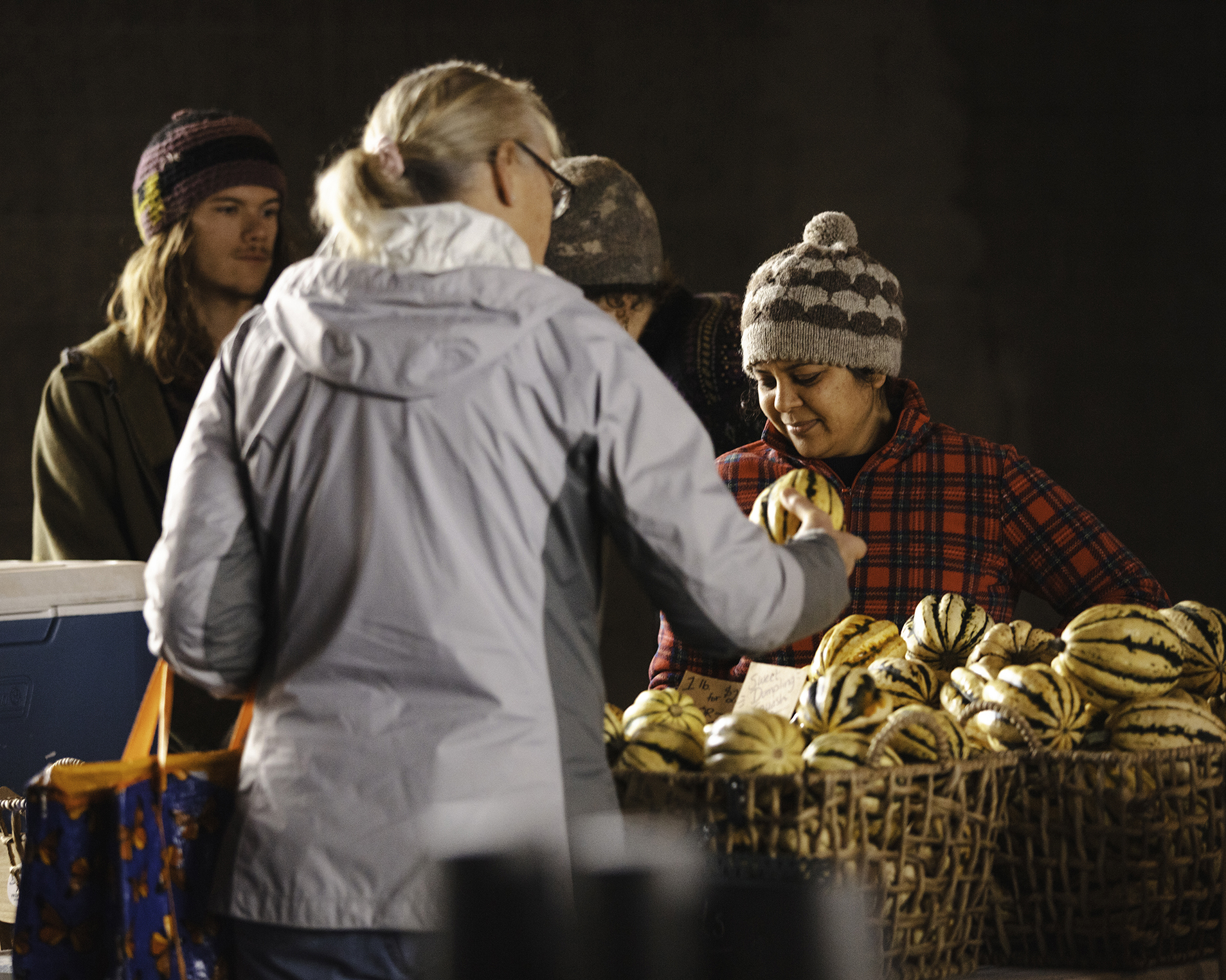
Hood River Farmers Market
Founded in 2006, Hood River Farmers Market is the flagship market of the beautiful Columbia River Gorge. The market, a part of the Gorge Grown Food Network, went year-round in 2017 and began accepting Double Up Food Bucks last year, both of which are huge steps for this community. Agricultural and service workers comprise a large segment of this 5-county central gorge region. With the high housing costs and low or fixed incomes, a large portion of the population suffers from food-insecurity. Even before the pandemic, a Columbia Gorge Health Council study showed one in three residents didn’t have enough to eat and as of 2021 and in some areas of Hood River Valley up to 82% of students qualify for free/reduced lunches. Making the market, and fresh food, more accessible for the community was a big goal of the Hood River Farmers Market leadership.
When Hood River Farmers Market began accepting DUFB last year, they saw a remarkable impact. Over 200 customers used SNAP for the first time, the average number of SNAP shoppers served each market day went up 150%, and there was a 95% increase in SNAP sales. Market-wide, the gross sales went up 17% and fresh produce sales hit record highs (up 20% over the previous year). Hannah Ladwig, the market manager said, “Farmers markets can sometimes feel out-of-reach for customers with limited or fixed incomes. DUFB helps us ensure we’re lowering those barriers and making the farmers market and local food more accessible to everyone in our community. This translates to more vibrant market spaces where everyone feels welcome!”
With about 45 vendors a week in the summer (peaking at 55) and around 30 vendors in the winter, the market is a varied and vital community hub for the Columbia River Gorge population. About 1200 shoppers come through per market day in the regular season and about 500 come through on a winter market day.
When I asked Hannah what she was looking forward to in 2024 she said, “Continuing our robust SNAP and DUFB program at the market! We’re constantly learning how to support customers and vendors better with insights and tools from Farmers Market Fund. I anticipate continued success as the program grows in popularity.”
Photos provided by Gorge Grown Food Network and taken by Paloma Ayala
– Written by Rachael Harms Mahlandt, FMF Communications Contractor
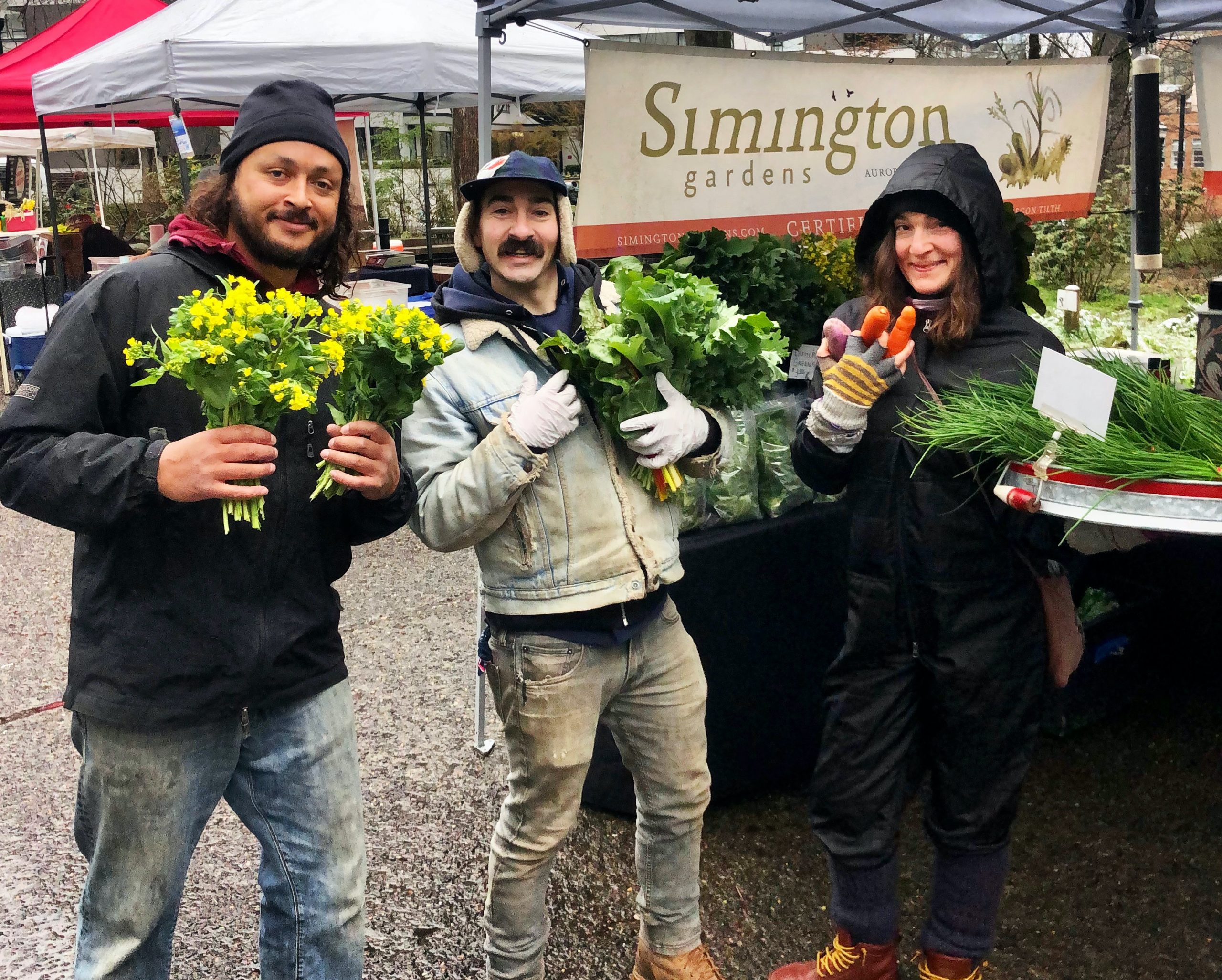
Simington Gardens, Aurora, OR
Mike Simington didn’t grow up on a farm, but he comes from a family of farmers. His grandparents on both sides were farmers, and while his parents chose a different path, he found himself drawn to the occupation. He knew that he wanted to be able to make a living and be outside, and farming seemed like the best way to do that.
He has been farming in Aurora, Oregon since 2009, and he’s been selling at farmers markets in the Portland area for about 8 years. At the Simington Gardens booth, you can find a wide variety of seasonal produce throughout the year. Mike’s favorite crop on offer is their salad mix. People really like it, and It matures relatively quickly. He plants in succession so he can still rely on it if something goes wrong with a single planting. Other crops are not so forgiving. The salad mix is also adaptable as the year goes on. The contents vary a bit from season to season, and that is part of what makes it special.
He tells me that selling at markets hasn’t really been a focal point of the business in the past but going forward it will be. “There’s lots of value in market farming” he tells me. He finds there is more stability, and he likes the direct connection. At the market he gets to hear from customers about what they like and how they prepare the produce he sells. He’s also been able to see the benefits of the Double Up Food Bucks program for his business as well as for his customers.
While he’s been selling at markets for years, 2020 was his first year accepting Double Up Food Bucks. “It’s awesome that people can get more money, get exposure to the market, have a little more money to spend, and try new foods for experimentation,” Mike said in regard to the program. “I’m happy that people are able to spend [the money] with us.” He explains that in his experience, it can feel like a risk for people to spend extra SNAP money on fresh produce at the farmers market when they are unfamiliar with the food or have not enjoyed it in the past. “When folx think of cheap food, they often don’t think of fresh vegetables,” says Mike. In a way, DUFB is turning that concept on its head because it’s taking away the added financial burden. It’s opening up the market to a whole new group of shoppers who might have never visited without the program.
Mike wants everyone, and particularly newcomers using programs like SNAP, Double Up, or FDNP, to feel comfortable in the market space. This year, he’s been able to make a few adjustments in order to price items by the piece rather than by the pound. “It’s really cool for folx to be able to say ‘I have $X’ and they can easily add up what they want.” Since DUFB and other vouchers are for a specific amount, shoppers know what they can afford before they get to the register. It takes out the guess-work and the potential awkwardness of having to put something back after everything has been totaled up. It allows every customer to shop on a level playing field. “If we can have all different walks of life shopping at the market, it will be more legitimate. It makes it more inclusive, more legitimate, more diverse, and in turn a more stable space,” he says.
For more information about Simington Gardens, visit them here, or pay them a visit in person to Beaverton Farmers Market, PSU Farmers Market, or Lents international Farmers Market! (Also, please note that the above photo was taken pre-COVID).
– Written by Mallory Watson, FMF Program Coordinator
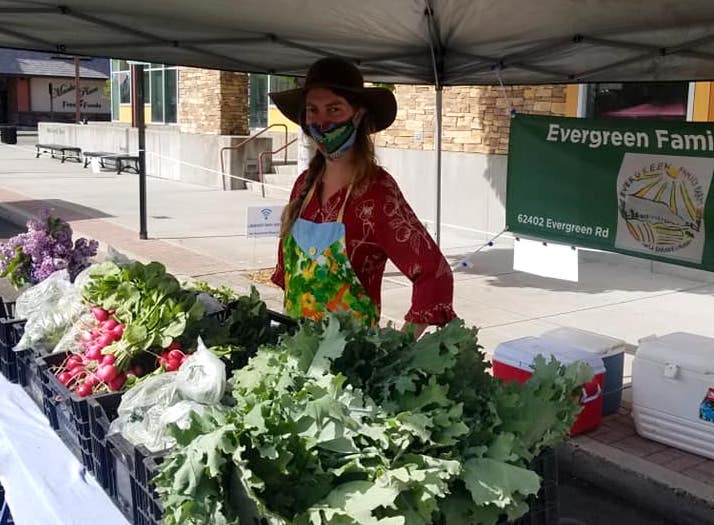
La Grande Farmers Market
This year marks the La Grande Farmers Market’s 40th Anniversary. Over these past 40 years, the market has built a strong connection to its community by supporting small, local farmers, and keeping its residents supplied with fresh, delicious food! When they began offering Double Up Food Bucks 5 years ago, they were able to provide even more support for the community. “We enjoy providing fresh local produce to everybody, not just those who can afford it,” says their market manager, Jessica Bogard. La Grande is rural, so a high percentage of people use the program and need it. Unemployment in the area is very high right now. [DUFB] makes it so that folks can shop at the market.” One way they are making food more accessible during the pandemic is by offering online pre-order and curbside pickup.
It’s not just shoppers who benefit from this program, though. Jessica tells me that in light of COVID-19, “It’s been challenging at the market. Vendors have been hit hard. Restaurant accounts are not an option.” It’s a story that we’ve heard time and again since the pandemic hit, but it’s been an especially big hurdle for this rural community. When COVID-19 first hit, Jessica tells me that people were scared, and the sales at the market took a dip. This really impacted their vendors. Some vendors weren’t able to participate in the market this year due to pandemic-related issues. For the vendors who are coming to market each week, “[Double Up] is keeping farmers afloat,” Jessica tells me.
In speaking with Jessica, it’s clear that the market is a reflection of the town as a whole: a tight-knit, rural community that looks out for one another. “La Grande is a great small town and we have a ton of support from our city and county and customers. We don’t get the huge numbers that other places do, but we have great support, and we appreciate that.”
– Written by Mallory Watson, FMF Program Coordinator
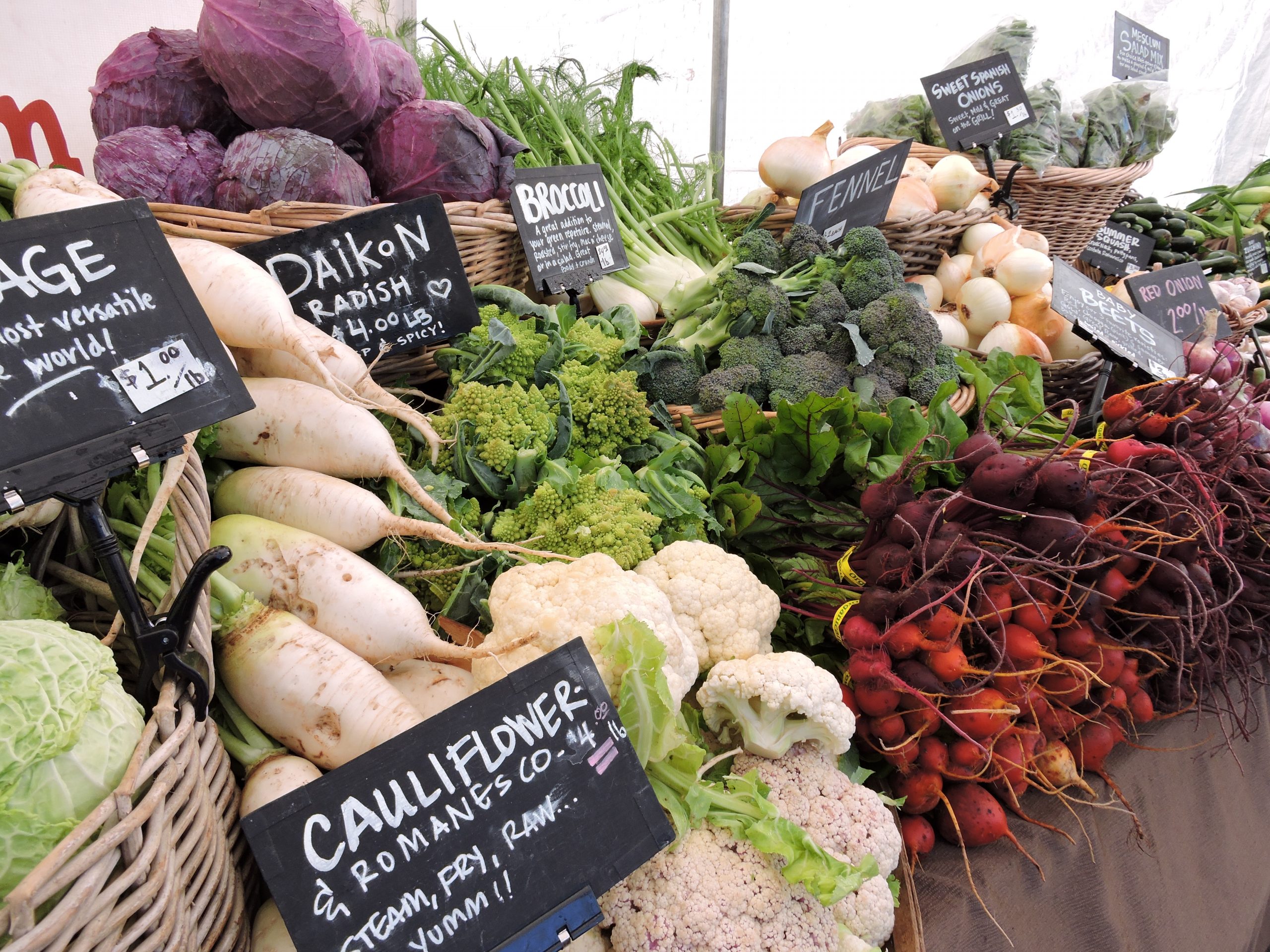
Lane County Farmers Market
As the oldest and largest farmers market in the region, the Lane County Farmers Market(LCFM) is a mainstay in the community. The market began in 1915 with 20 vendors. Over the years it has grown and changed, splitting from the neighboring Eugene Saturday Marketwhich features arts and crafts, and shifting their focus to local food producers in the 1970’s. Around this time the market also began accepting SNAP, and have continued to ever since.
LCFM implemented the Double Up Food Bucks (DUFB) program for the first time in 2016, and in 2017 (their biggest year for the program) they distributed almost $70,000 in Double Up, and had $90,000 in SNAP sales. Prior to implementing the program, their SNAP sales were significantly lower, around $60,000 per year.
Since 2018, due to limited funds LCFM has only offered DUFB at their Tuesday market. With the new infusion of state funding for the program, they have been able to extend the match to their Saturday market once again. Meghan Verberkmoes, LCFM’s Membership and Marketing Coordinator, believes this will make a huge difference for shoppers and community members who are impacted by COVID-19. The economic effects of COVID-19 have hit the community hard, and LCFM hopes to reach even more SNAP shoppers than before. Meghan says there have already been many first time SNAP shoppers using their benefits at the market.
Shoppers have been very grateful for the program. One LCFM shopper shared, “We rely on Double Up for our produce. We cannot afford vegetables without Double Up. We went from buying at farmers markets 1 or 2x per year to 2x per week!” Farmers are also thrilled to see the program at the market. “DUFB is a win-win for local farms and food assistance,” said Kris Woolhouse of Ruby & Amber’s Farm. “I’ve noticed an increase in use from our customers during this pandemic. We hope this assistance stays in our farmers market indefinitely.” So far this season, LCFM has distributed over $16,000 in Double Up Food Bucks to community members, illustrating the positive impact the program has for both SNAP shoppers and farmers.
In the wake of COVID-19, the market was forced to make some big changes, but they have remained dedicated to supporting their local producers and to providing access to fresh food for people who need it. “Lane County is among the 6 most food insecure counties in the state, which makes the program that much more valuable,” Meghan shared. According to a Department of Human Services report from May, the number of households using SNAP in their district has risen 24.7% since 2019.
It’s been difficult for market staff, vendors, and shoppers alike to navigate new and changing COVID guidelines, but everyone is happy to see that the DUFB program has returned. “So many people use it year after year, and people are still excited. It doesn’t matter who it is, it elicits a really happy response. It feels great to have one thing to cheer people up, to have good news to share,” says Meghan.
LCFM has been working hard to follow the governor’s orders and keep their community safe. Visit www.lanecountyfarmersmarket.org/our-safety-plan to learn about their safety guidelines before visiting the market.
– Written by Mallory Watson, FMF Program Coordinator
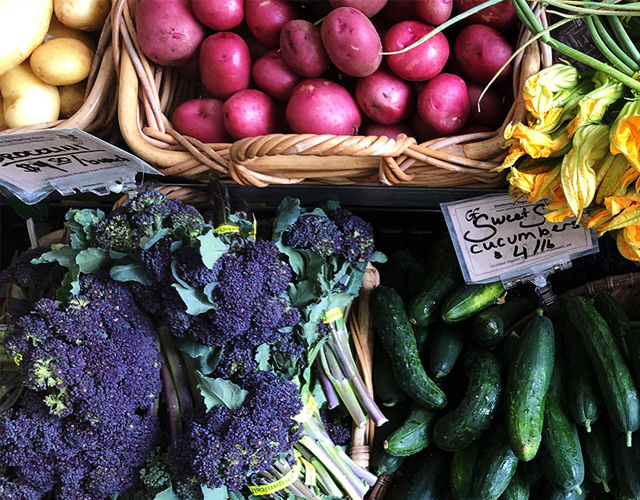
Umpqua Valley Farmers Market
Nestled in the beautiful Umpqua Valley in Roseburg, OR, the Umpqua Valley Farmers Market has had a strong community backing since its inception in 1994. The market was started by a group of Master Gardeners who, as market manager Amanda Pastoria puts it, “saw a need for it, and wanted to have an outlet for their passion and hobbies.” Each of the founding members pitched in money for advertising and signage. Twenty-six years later, the market is thriving and it hasn’t lost its sense of community.
UVFM began accepting Double Up Food Bucks in 2015. “We knew there was a need to be filled in the community, and this was a perfect opportunity for Douglas County to bridge that gap for food insecurity.” According to Amanda, there is a 14% food insecurity rate in the area, so it made sense for the market to offer a program like Double Up. Amanda came on as market manager in 2017, and says that the Umpqua Valley Farmers Market matched $10,182 in Double Up Food Bucks that year! The program continues to have a positive impact. Shoppers who use Double Up are happy to be outside, breathing fresh air, interacting with other people, and being a part of the community. The farmers are happy about seeing more customers at the market, and feel good knowing they are filling a deep need.
The broader community of Roseburg has been an integral part of the success of the market’s Double Up program. Amanda has a great rapport with the local Department of Human Services office (where participants register for SNAP), and she has already seen many new customers as a result of DHS outreach this year. The market also sees lots of involvement and support from local restauranteurs, farmers, and chefs, and is currently planning a Farm-to-Fork dinner to raise additional matching funds. The dinner will be prepared by a local catering company that specializes in beautiful, high quality farm-to-table food.
Having support for Double Up Food Bucks has also made space for the market to offer other programs. In partnership with OSU Extension and UCAN, they host a kids’ program called Food Hero, where kids can come to the market and do a fun activity, a food tasting, and receive a $2 token to spend on whatever they want at the market. Notably, the kids sometimes have the opportunity to ride the “blender bike” to blend up smoothies with produce from the market or to grind local grains to make flour.
All in all, Amanda sees DUFB as a “win-win for the community and for the farmers who want to continue to feed people. It fills a need in the community in a way that is using [the farmers’] passion, and it gives back to them too.”
– Written by Mallory Watson, FMF Program Coordinator
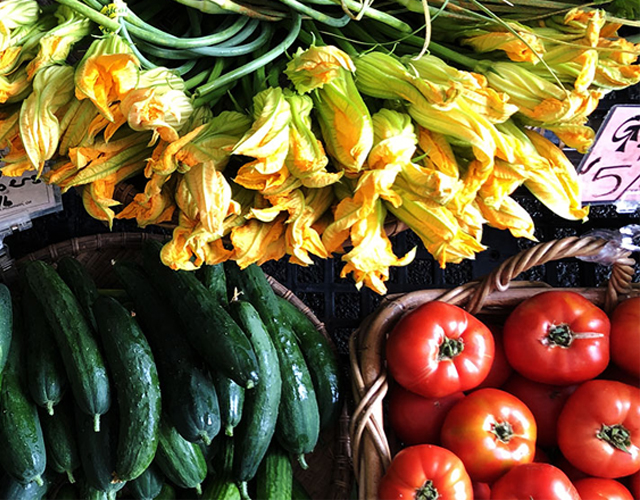
Anna Springer: Farmer, Manager, Customer
We know that Double Up Food Bucks supports farmers, markets, and customers. Anna Springer is living proof of all three.
If you’ve been to farmers markets in the Portland region, you’ve probably seen Anna—she managed the Kenton market and could be found at the King, Lents International, and Portland State University markets. As a market manager, she was responsible for the logistics of the DUFB program to extend customers’ SNAP dollars at several markets.
During her time working with Portland Farmers Markets, Anna drew inspiration from the farmers she worked alongside as they steadfastly assembled their intensive setups with tables, tents, and heavy crates of potatoes in the rain and 5:30-a.m. darkness.
Even though that’s enough to make anyone grumpy, Anna found the farmers pleasant, willing to help, and able to handle anything—always with a specific sense of sarcastic humor. She witnessed the bonds between them: “In the market manager booth, you see all the farmers chat about what happened that week and what’s going on with this or that crop; there’s cooperation and community, not unhealthy competition.”
That’s when she thought, “I want to be on that side of the market.”
Now, Anna is a farmer at Lil’ Starts Urban Farm & Plant Nursery, which has operated for a decade in North Portland and recently expanded to a second site in Gresham as part of the Headwaters Farm Incubator Program.
Along with their produce, Lil’ Starts grows plant starts, which Anna has sold to DUFB shoppers so they can grow their own food. “One of my favorite customer interactions is when folks who bought our plant starts come back later in the season for growing advice or to show us the amazing tomatoes they’ve produced!”
In addition to helping get produce (and plants) to low-income folks and supporting farmers with extra income, DUFB has helped out farm businesses in a less obvious way—with consistent branding. “So many markets from different organizations know about DUFB, so the farmers, markets, and customers are all on the same page. Now there aren’t multiple bonus currencies to keep straight, and regulations are clear for farmers and customers.”
That’s not all—prior to her lives as a market manager and as a farmer in Portland, Anna benefitted from DUFB as a shopper herself while living in Michigan, the state where the program was born. She owned a small sorbet company and bought fruit from local producers, while also starting a co-op of small businesses interested in making local agriculture a bigger part of the food culture in Detroit.
Not only did DUFB let her buy nutritious food that made her feel better, but “it also allowed me to buy from the farms featured in some of my favorite businesses and restaurants even though I couldn’t afford it at the time,” she said. DUFB helped further her vision of a mutually supportive small business network.
There’s a lot of overlap between the market manager world and the farm world, according to Anna. They draw similar skill sets—Anna loves to be outside, appreciates the seasonality of the work, and gets to think both short-term and long term with a mix of tangible tasks that let her work with her hands and strategic planning into the future.
As Anna has experienced, Double Up Food Bucks helps support the connections between farmers, markets, and customers.
– Written by Love Jonson
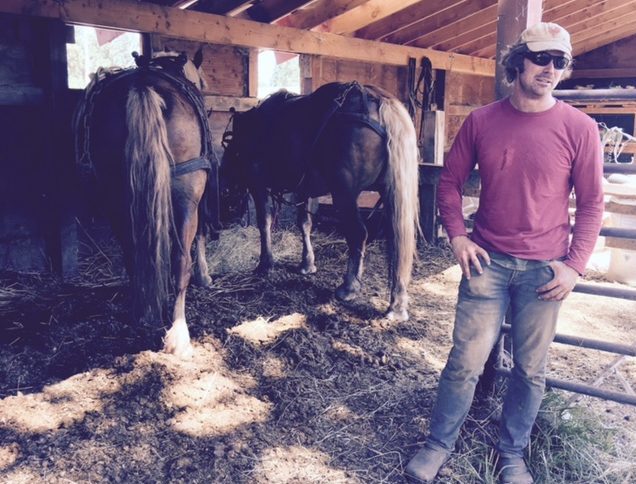
Aaron Nichols: Stoneboat Farm
On their farm just outside Portland in Helvetia, co-owners Aaron and Jesse Nichols and their crew grow produce year-round. Fruits and vegetables make up the majority of the products they sell, but they also raise turkeys. Aaron says they do this to have animals on the land to eat vegetable scraps, help with weed and pest management and to help create rich compost to feed back into the soil. (They also feel good about giving a good life to 100 or so turkeys each holiday season). While the organic certification process is cost-prohibitive for them, they follow many of the guidelines and use natural pest control methods, which you can learn more about here.
Stoneboat has been involved in some sort of SNAP match program since they started selling at farmers markets 6 years ago. Aaron says that he’s always seen a positive benefit to his sales as a result. “I would give [food] to people if I knew they needed it, but this way it’s more accessible because they don’t have to ask,” he tells me. He likes to make it worthwhile and welcoming for SNAP shoppers at the market, and makes sure they are getting their money’s worth by rounding up with produce. If someone only wants $1.50 worth of something, he’ll give them a few more items to make up the other $.50. He says that shoppers show so much appreciation for the program, and he appreciates them, too!
In addition to the matching program at the market, Stoneboat is also involved in the CSA, or Community Supported Agriculture, matching program where a match of up to $200 is provided. Traditionally CSA shares are paid for in full at the beginning of the growing season, but for this program monthly payments are withdrawn from the customer’s SNAP account throughout the season. Aaron says he really gets to know his CSA members, and he can see directly how they benefit from getting fresh veggies each week through his interactions with them. DUFB CSA members have also been some of his most dedicated customers, returning year after year for the CSA program.
In addition to his work running Stoneboat Farm, Aaron is also a member on the board of the Hollywood Farmers Market. Before Double Up Food Bucks, he says the board was responsible for raising the money to fund their SNAP match program, but now that they have this funding from FMF, they are able to focus on widening their reach even further. This year they will have the space to fundraise to provide vouchers to residents in low income housing near the market, bringing fresh, local food to more people in Portland!
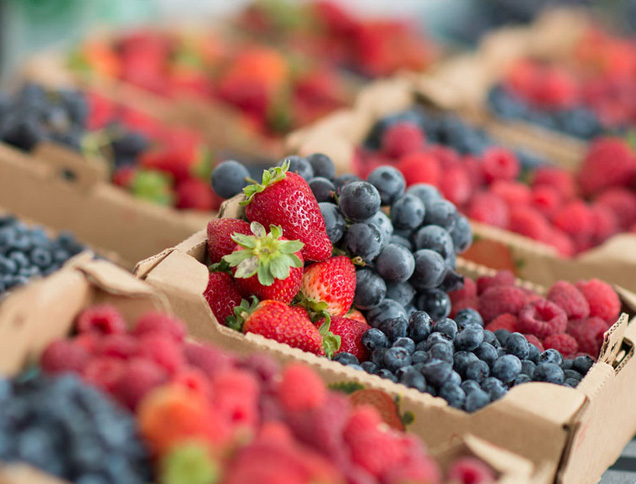
Michael C, Portland Farmers Market Shopper
Michael, a native Portlander, found out about Double Up Food Bucks about a year ago. Since then he has been encouraging folks in his position to check the program out. For him, taking advantage of Double Up Food Bucks is a “no brainer.” He says the matching program has completely changed the way his family shops and eats for the better.
Michael and others with SNAP benefits are eligible for a $10 match when they spend $10 of their SNAP money at a participating farmers market. Shoppers can use the Double Up money to purchase fresh fruits, vegetables, mushrooms, herbs, veggie starts, and nuts. Michael explains that it would be really challenging for his family to eat as healthfully as they do now if it weren’t for this program to stretch their benefits each week. He really likes that Double Up Food Bucks makes shopping at the market more accessible to them.
Michael and his family go to the market as often as possible. During the main market season, they usually make it out a couple of times a week, visiting Lents, King, Shemanski Park, Kenton, and even PSU (although the PSU market doesn’t currently offer DUFB). Since they go so frequently, they’ve gotten to know farmers at the market, and he feels good about where his dollars are going. “It’s a different experience than going to the grocery store,” he says, “It helps me feel like I’m contributing more to the farmers. I like that [they] get the majority of the money for their products.”
His family’s favorite thing to buy at the market is Hood strawberries. They like to get flats of the seasonal treat in order to make jams and sorbets at home. He says that with their frequent market visits, they’ve made friends with some of their favorite vendors and occasionally they are even able to get deals on overripe strawberries for their sorbets!
For Michael, a trip to the farmers market is more than just a shopping trip. “It turns into an activity for me and my daughter,” he says. Even though they live in Gresham, it’s worth it for them to travel to the markets in Portland because of the money they are able to save on produce. His young daughter loves to go to the Lents market for their Food Scouts program. It is fun for her to do the activity each week and pick out something that’s just for her with her $2 market token (learn more about Food Scouts here). When they get home, they are able to cook and enjoy the food as a family. For them, DUFB has helped turn shopping and cooking from necessary chores into fun, quality time spent together.
– Written by Mallory Watson, FMF Program Coordinator
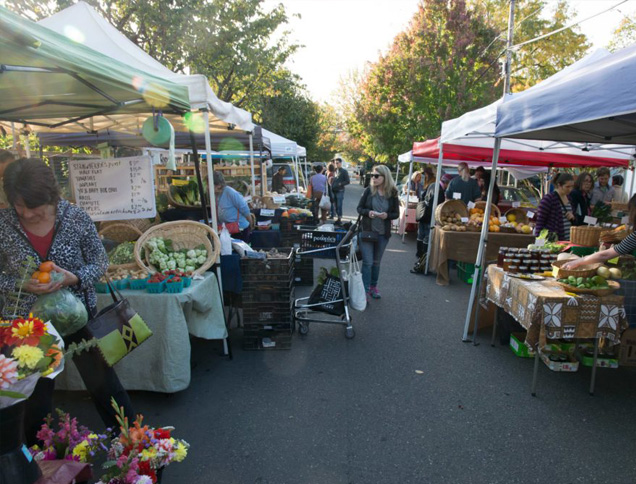
People's Farmers Market
People’s Farmers’ Market, which proudly bills itself as the longest-running year-round farmers market in Portland, has a long history with SNAP matching. It has offered its customers an additional $5 match when they spent $5 in SNAP benefits at the market since 2013. The farmers market also has the second-highest SNAP spending in the state!
In 2015, the Farmers Market Fund convened a coalition of markets in the Portland metro area to secure a federal grant to double that SNAP match to $10 per customer. SNAP usage skyrocketed when the match grew from $5 to $10. Vendors noticed that increasing the match to $10 meant customers increased how much they spent with SNAP benefits at their booths.
By the time the federal funding ran out in 2017, the market needed to find a new way to help its customers’ SNAP benefits go further. People’s market manager Ashley Todd had noticed the positive impact the additional $5 specifically brought to her customers and her vendors. “With an average of 65 families per week at a year-round market supporting 30 small-scale, family farmers and food producers, we knew we had to maintain our $10 match.” So they decided to fund it themselves.
Ashley and the team at the Co-op decided to include a $10 match as part of their operating expense budget for 2018 and sought round-up donations at the Co-op’s cash registers. They also sell merchandise and accept donations online to fund the SNAP match. Vendors even unanimously agreed to raise their booth fees to fund the $10 match. “Vendors knew the extra $5 to $10 a week they spent in booth fees would come right back to them—but they also realized that greater food access and more food dollars benefit the whole community,” Ashley said. The program was so successful—the co-op spent nearly $24,000 on it in 2018—that it wasn’t sustainable for them to continue funding it this way. Fortunately, in 2019, things changed.
After persistent and collaborative advocacy led by the Farmers Market Fund, the state legislature approved a historic measure to expand Double Up Food Bucks just as the doors closed on dramatic legislative session. More than 50 markets across the state, as well as grocery stores and farm share programs, will now be able to offer a $10 match to all their customers paying with SNAP, supporting food access in the community and the livelihoods of small-scale farmers.
However, while that $1.5 million appropriation from the state represented a major win for Double Up—and the first time the state has invested in the program—it was only half of the $3 million initially requested. Farmers Market Fund hopes to continue to grow its resources so it can replicate the success of the People’s Farmers’ Market’s $10 match at more of Oregon’s 124 farmers markets.
Back at People’s, Ashley knows more funding for Double Up will help make farmers markets more inclusive across the state. Despite the People’s Farmers’ Market’s high SNAP usage, farmers markets and food co-ops are often perceived as expensive and privileged spaces, and Double Up helps address that barrier.
“Lots of families and elder folks using Double Up tell me they’re on a limited income,” said Ashley. “But the SNAP match program helps people know this space is accessible to them and that our co-op is trying to make food more affordable for people.”
– Written by Love Jonson
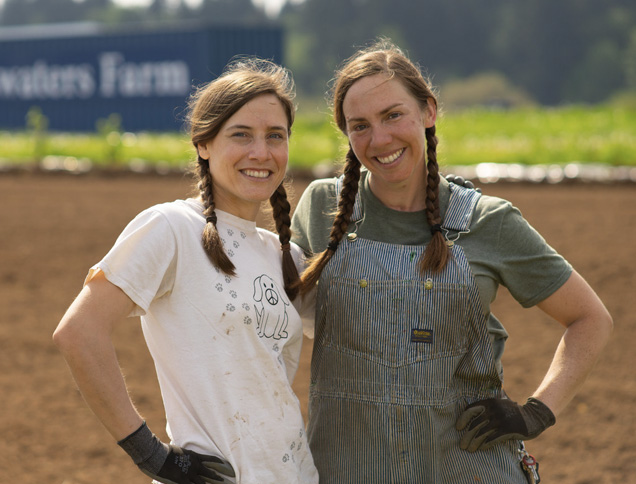
Nicki Passarella, Amica Farm
For one Double Up Food Bucks vendor, selling as a first-year farmer is just her latest role in the farmers market scene. Amica Farm co-owner Nicki Passarella sells at the Moreland and Woodstock Farmers Markets, but she served as a manager, staff, and volunteer of the Portland Farmers Market organization for eight years.
In 2017, Passarella decided to move higher up the production chain and step into farming herself, so she joined Zenger Farm as an intern and then founded Amica Farm as part of the East Multnomah Soil and Water Conservation District’s Headwaters Incubator Program one year later.
This transition from market manager to farmer has given Passarella a broader perspective on how Double Up Food Bucks impacts local food production. As a farmer, she finds that the market manager and board who promote SNAP matching make the program successful, allowing her to provide food at a price people can afford with no extra legwork on her part.
The bottom line is that the reason I farm is to feed my community, and assistance programs like Double Up Food Bucks make that community wider, broader, and more diverse. That’s what feeds me as a farmer,” said Passarella.
In addition to making produce affordable to those to whom it may have proven prohibitively expensive, another measure of success for Double Up Food Bucks comes in farmers’ sales numbers.
Even though, as a businessperson, Passarella would want to market to lower-income customers, she doesn’t have the capacity to do so when she’s farming full-time. When markets promote Double Up Food Bucks, her business benefits from more customers coming back to her booth week after week.
“Having repeat customers, whoever they are, feels like a beautiful thing to me, but I feel that tenfold when I have repeat customers who use SNAP. I can build the business by chit-chatting with them, and they tell me what they did with their squash, that they value these dollars, and that our produce makes them come back to market,” said Passarella.
Passarella and many other small-scale farmers want to nourish as much of their community as possible, but that goal must be supported by dollars. “It’s not sustainable to just want to feed my community,” notes Passarella, “but the extra funds from Double Up Food Bucks help the farm keep growing.”
– Written by Love Jonson, Food Systems Writer and Editor
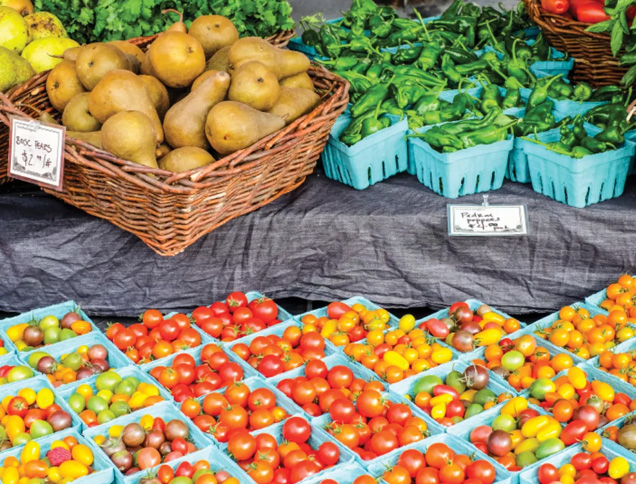
Charlie Tenenbaum, King Farmers Market Shopper
You’ll find Charlie Tenenbaum most Sunday mornings at the King Farmers Market, just a few blocks from their Northeast Portland home. (As a transgender individual, Charlie uses they/them pronouns). An avid fermenter, Charlie recently picked up some kohlrabi, bok choi, and daikon radishes to make into kimchi. With the market closed for the winter, they have also squirreled away a stash of onions, delicata squash, and greens for the freezer to help hold them over until the market reopens in the spring.
Charlie relies on the Double Up Food Bucks (DUFB) program to be able to purchase produce at the farmers market. Using their Oregon Trail Card, Charlie can receive an extra $10 per week to purchase fresh fruits and veggies to help make their very limited disability payments and SNAP benefits stretch further. The produce they get at the market helps them feel healthier as they manage their chronic pain that prevents them from being fully employed.
Being able to shop at the farmers market plays an outsized role in their life. With post-traumatic stress disorder gained from relief work in post-earthquake Haiti, Charlie gets agitated in indoor supermarkets, and feels much more comfortable shopping in an outdoor venue.
Patronizing the farmers market also makes Charlie feel like they don’t have to compromise their values to feed themselves. They have a deep background in sustainability. Before they became disabled, Charlie worked on biodiversity and food justice issues through their efforts at seed libraries, CSA farms, and the Denver Botanic Gardens. They started down this path while in college, interning at a USDA seed bank working on biodiversity protection.
Charlie knows what it is like to not be able to afford the food that is best for their health or spirit. Homeless for a stretch, living out of their car, Charlie didn’t have a place to cook. They found themselves purchasing unhealthy, inexpensive, and ready to eat food that was detrimental to their health and contrary to their values.
As a result, Charlie feels a deep sense of gratitude for the Double Up Food Bucks for its positive impact on their health and spirit.
– Written by Andy Fisher, Farmers Market Fund Board member
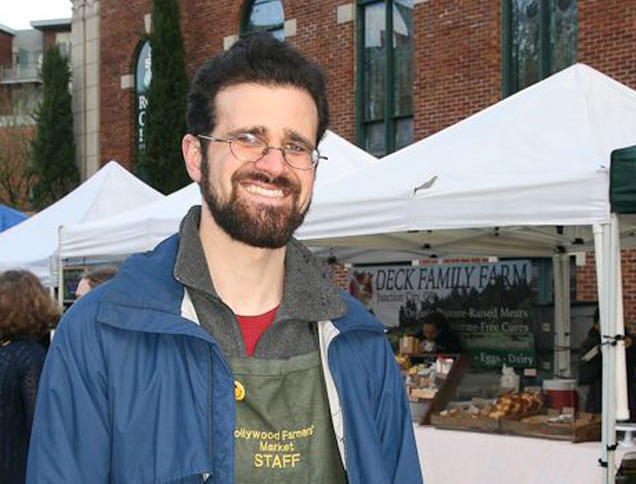
Ari Rosner, Hollywood Farmers Market
For Hollywood Farmers Market coordinator Ari Rosner, Double Up Food Bucks served as a way to extend one market’s successful SNAP matching program to a second market. In 2010, before the Double Up Food Bucks program began, the Hollywood Farmers Market in Portland began matching shoppers’ SNAP tokens up to $5 — and with the support of Farmers Market Fund, the program was able to spread to Hollywood’s sister market, the Lloyd Farmers Market.
When Hollywood Farmers Market took over management of the Lloyd Farmers Market seven years ago, Lloyd had no way to accept SNAP, let alone match it. As both markets joined the Double Up Food Bucks program, each could to offer a $10 match — double what Hollywood had been able to offer and, in total, $20 more in than Lloyd SNAP shoppers could previously use.
For the Hollywood market, a large and visible mainstay in the neighborhood, word of mouth was enough to spread awareness about matching programs. In the Lloyd district, the market had to start from scratch to get the word out, since it had very little existing engagement with low-income neighbors.
The Lloyd market targeted their outreach to public housing, senior communities, and other low-income residents in the neighborhood. Market staff visited buildings, spoke to neighbors, answered questions, and helped folks understand the different benefit programs they could use at market.
Rosner has seen roaring increases in SNAP use each year — both throughout the economic recession and, importantly, even as the economy has rebounded.
“Even with the economic recovery, there have been solid increases every year, as more people who have been left behind by the recovery are discovering that they can stretch their dwindling dollars even further by coming to the farmers market.”
Shoppers’ satisfaction with SNAP matching are backed by both informal conversations and hard numbers: the number of SNAP transactions at markets has increased by 39%, and 90% of SNAP customers reported purchasing more fruits and vegetables. In the past, some shoppers have had to eat whatever was cheapest at the grocery store, but now, Rosner’s customers tell him they can buy organic produce and make connections with farmers — things they didn’t think they’d be able to do on SNAP.
In surveys, a significant majority of SNAP shoppers say matching helps them stretch their benefit dollars later in the month, alleviating the cycle SNAP recipients face in which the fridge runs empty by before the next benefit cycle. 81% of shoppers report that DUFB has increased the amount of food in their house.
“They go hungry less, which is really what this is all about,” said Rosner.
– Written by Love Jonson, Food Systems Writer and Editor
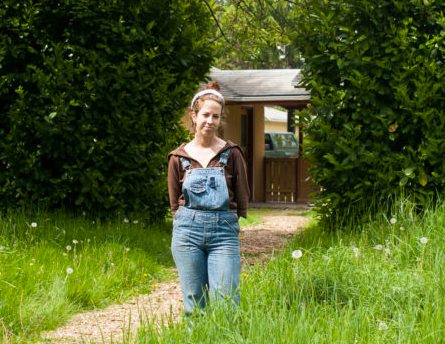
Genevieve Flanagan, Urban Acre Homestead Farm
According to Urban Acre Homestead farmer Genevieve Flanagan, a first-year vendor at the Lents International Farmers Market, many farmers growing organically can’t afford to buy the produce they sell. Given her farm’s small scale on a one-acre lot in a northeast Portland neighborhood, Double Up Food Bucks has proven a significant factor in Flanagan’s ability to make the numbers work—both for her bottom line and for her customers’.
Flanagan notes that many farmers and farm apprentices receive some type of food assistance, just like their customers at market. When small-scale farmers growing organically run into the economic reality that they have to charge more for their food than they would personally be able to pay in order to cover their production costs, Double Up Food Bucks helps them remain economically accessible to their customers in similar financial situations as them.
As a current Lents International Farmers Market vendor and a former apprentice at Zenger Farm (the organization who reinvigorated the Lents market in 2006 to build on their existing food access efforts in one of Portland’s most ethnically diverse and lowest-income neighborhoods), Flanagan knows firsthand that she’s serving folks who don’t have many other options to access fresh, local produce.
“Even in Portland, there are still parts of the city that don’t have thriving food centers where people can get produce from a coop or some of the nicer grocers downtown. They might rely more on whatever’s on sale at Fred Meyer or Safeway, so it feels really great for people to be able to have the experience of going to the farmers market, talk to farmers about how they’re growing food, and then actually be able to pay for it.”
The $2 denomination of incentives that Double Up Food Bucks uses strikes the balance between providing a meaningful amount of money for customers and allowing them flexibility, says Flanagan. Mushrooms provide a particularly illustrative example of how folks spend their Double Up Food Bucks at her booth.
Double Up Food Bucks allows people to buy what they may consider a “bonus” item—“something they may think they normally couldn’t afford but that they would really like to incorporate into their diet,” says Flanagan. But mushrooms shouldn’t be considered a bonus—Flanagan calls varieties like the shiitakes and oysters she cultivates “medicinal powerhouses.”
From mushrooms to burdock root, harukei turnips, and bouquet garni, Flanagan knows Double Up Food Bucks is helping Lents customers stretch their dollar. “It’s awesome to be at Lents selling to this audience because I know the area needs more options, and I don’t think people who want to patronize my farm would be able to do so if they did not have access to this form of payment.”
– Written by Love Jonson, Food Systems Writer and Editor • Image by Meaghin Kennedy
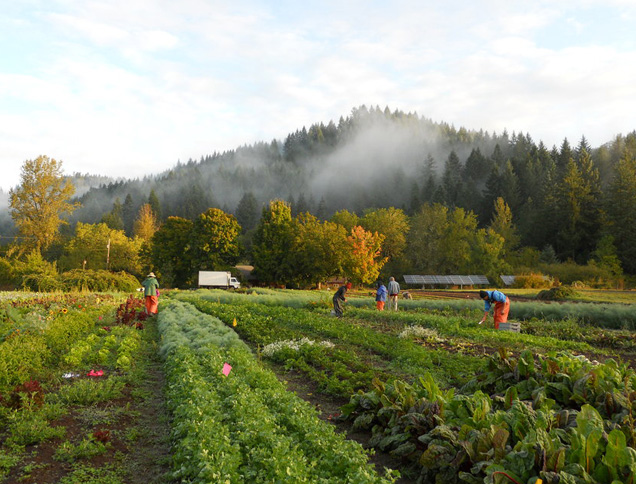
Persephone Farm
“Rising Prices Got You Down?” reads a sign that hangs at Persephone Farm’s booth to describe, in English and Spanish, the farm’s policy of offering a 20 percent discount to folks using food assistance — Supplemental Food Assistance Program (SNAP) tokens, Double Up Food Bucks, and Farm Direct Nutrition Coupons.
A mainstay at the Hollywood, Salem, and Portland State University farmers markets for nearly three decades, Persephone Farm produces seasonal, Oregon Tilth-certified organic vegetables alongside the South Santiam River in Lebanon, Oregon. Named after the goddess of the seasons, Persephone grows in accordance with the earth’s patterns, letting all plants come to fruition outside and minimizing the use of disposable plastic as much as possible.
Producing high-quality vegetables with maximum flavor and minimal ecological footprint requires additional time, care, and resources from the farm, but Double Up Food Bucks helps Persephone’s 20 percent discount go further for its customers. Cognizant that the farm’s prices have been rising on a regular schedule in accordance with wage increases, co-owner Elanor O’Brien sought to recognize the difficulties for folks on fixed incomes and offer some assistance.
The farm must charge enough for the produce to be able to pay its employees a living wage. “We don’t have a lot of leeway on that, but I understand that when someone’s on a fixed income they don’t have a lot of leeway either, so we like being able to meet them at least part of the way. We want to support that they’ve chosen to come out to the farmers market and use part of their income to choose healthy food — that makes me happy.”
The extra assistance offered by Double Up Food Bucks helps put Persephone Farm in touch with a broader population than they would otherwise be able to reach. The farmers market is a place to interact with a more diverse and even international community than vendors and shoppers may see in their own hometown or neighborhood. Some customers who have not experienced certain foods have a chance to learn about how to prepare them from farmers at market — and vice versa.
Double Up Food Bucks helps to bridge the gap between supporting living-wage jobs for farmworkers and ensuring organic produce is accessible to low-income eaters. The program benefits the farm’s economics by providing an additional percentage of gross sales, but Double Up Food Bucks comprises 100 percent of the currency used by some of Persephone’s regular customers. Notes farmer Cora Payne, “The surprise, gratitude, and smiles I get when I see folks using Double Up Food Bucks and am able to offer them a discount are often some of my favorite moments at market.”
– Written by Love Jonson
When Hollywood Farmers Market took over management of the Lloyd Farmers Market seven years ago, Lloyd had no way to accept SNAP, let alone match it. As both markets joined the Double Up Food Bucks program, each could to offer a $10 match — double what Hollywood had been able to offer and, in total, $20 more in than Lloyd SNAP shoppers could previously use.
For the Hollywood market, a large and visible mainstay in the neighborhood, word of mouth was enough to spread awareness about matching programs. In the Lloyd district, the market had to start from scratch to get the word out, since it had very little existing engagement with low-income neighbors.
The Lloyd market targeted their outreach to public housing, senior communities, and other low-income residents in the neighborhood. Market staff visited buildings, spoke to neighbors, answered questions, and helped folks understand the different benefit programs they could use at market.
Rosner has seen roaring increases in SNAP use each year — both throughout the economic recession and, importantly, even as the economy has rebounded.
“Even with the economic recovery, there have been solid increases every year, as more people who have been left behind by the recovery are discovering that they can stretch their dwindling dollars even further by coming to the farmers market.”
Shoppers’ satisfaction with SNAP matching are backed by both informal conversations and hard numbers: the number of SNAP transactions at markets has increased by 39%, and 90% of SNAP customers reported purchasing more fruits and vegetables. In the past, some shoppers have had to eat whatever was cheapest at the grocery store, but now, Rosner’s customers tell him they can buy organic produce and make connections with farmers — things they didn’t think they’d be able to do on SNAP.
In surveys, a significant majority of SNAP shoppers say matching helps them stretch their benefit dollars later in the month, alleviating the cycle SNAP recipients face in which the fridge runs empty by before the next benefit cycle. 81% of shoppers report that DUFB has increased the amount of food in their house.
“They go hungry less, which is really what this is all about,” said Rosner.
– Written by Love Jonson, Food Systems Writer and Editor
